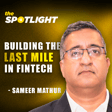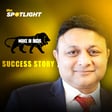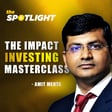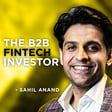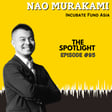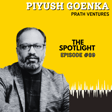Become a Creator today!Start creating today - Share your story with the world!
Start for free
00:00:00
00:00:01

Saloni reveals an early-stage VC firm's approach to investing
Explore the exciting realm of early-stage investments with Sunicon Ventures, a venture fund with a wealth of experience in driving innovation across various sectors, including Blockchain, AI/ML, Consumer, Healthcare, EdTech, and FinTech. Saloni dives into the company's beginnings, what makes a startup attractive for investment, what investors seek in the early stages before products are ready, and the warning signs founders should be aware of when pitching their ideas.
Get notified about the latest releases and bonus content by subscribing to our newsletter at www.founderthesis.com
Transcript
Saloni's Journey to Venture Capital
00:00:00
Speaker
Hello, everyone. I am Saloni Jain, our founder and managing partner at Sinai Conventuals. So, Saloni, you must be probably among the youngest VCs in India. Tell me how that happened. Tell me about the journey to becoming a venture capitalist.
00:00:25
Speaker
So, the journey started, I think when I started meeting a lot of startups and especially companies which were started by people of my age, right, if you go back in 2015-2016,
00:00:37
Speaker
I mean, I was 25-26 back then and most of the startup founders were of the similar age bracket, right? During that period, I had moved to Delhi in Gurgaon because I was working with L&T Finance. And Gurgaon being the hub of startups, I happened to meet a lot of entrepreneurs. And one of the interesting stories is that Uber had launched something called as Ubershare.
00:01:04
Speaker
So, I used to take over share and go from Gurgaon to Kannad place every single day.
00:01:10
Speaker
And out of five working days, three working days, I used to meet some co-founder or the other hustling and telling me his story for one hour. And I think that's where, you know, I started to know their problems. And I realized that finance and fundraising is a big piece of it. So when I decided to do something on my own and join my investment bank, which is my family business, I said, I want to work with these young companies, which we are not working with currently.
00:01:40
Speaker
And that's where we decided we'll start a small family office cum advisory service in late 2018. And the idea was to A, advise startups and B, also invest our own capital and understand the whole journey, see how much it multiplies, what are the risks and returns we see in this asset class.
00:02:03
Speaker
Before, also that time, there was no thought of starting
Starting a Family Office
00:02:06
Speaker
a fund. It was more like, you know, working with these companies. Also, we had a very interesting philosophy at that time that we had a lot of old economic connections, manufacturing companies, large business houses, and they all lacked technology. They all lacked fresh thinking.
00:02:23
Speaker
And we thought in India, as a country, only capital is not going to help these companies. They do need a lot of business connections to actually grow and be able to make it big. And that we feel, even today, that's one of the value additions we give from our funds, even today. So we started with that philosophy, and since our 2-3 years experience was phenomenal, we saw great traction within our portfolio companies, we built our internal thesis, that's how we decided to launch the fund last year.
00:02:54
Speaker
Alright, amazing. So, initial couple of years, it was like your family's wealth being invested. It was family's wealth, Akshay, and we had a lot of H&Is in our network, right? So, wherever we used to invest, so we invested anywhere between 25 lakhs to 1 crore. And wherever we invested and we decided we'll take active interest, we had a bunch of people who kind of followed us and supported us and these portfolio companies.
00:03:23
Speaker
And since they also had good experiences, they all are today our investors in the fund as well. So that's how the journey started. All right. Amazing.
Family Business Insights
00:03:31
Speaker
You tell me about the family business, the investment bank, which your father writes. What does that do? So it's something which we started in 2005. It's called San Capital. It's an investment bank which does debt syndication. So we raise debt through banks, NBFCs, private lenders for larger companies. We also have a merchant banking arm. So we are SEBI registered merchant bankers. We do SMEIPOs, main board IPOs, stuff like that.
00:04:04
Speaker
So merchant banking is the business of listing companies. Merchant banking is the business of listing companies. And if you see our roots, my dad started as a broker. So we are network broking was our entity, which he started in 94, which we exited in 2000.
00:04:20
Speaker
When we started, we were the largest brokers. We had 200 branches. The first broking company ever in India to get listed on NSC BSC. Now it's called MONAC Net Worth and it's doing phenomenally well. So our history has been into equity investing. We have grown up seeing that, right? It could be SMEs, it could be startups. Most of the SMEs now call themselves startups. So the genesis, the thesis remains the same.
00:04:50
Speaker
Yeah, interesting. Your father was running a publicly listed brokerage company. Why did he decide to exit? Was it acquired by a fee? No, it was not acquired. It was a strategic acquisition, a company called Monak acquired.
00:05:10
Speaker
in 2004 and I think he decided to exit for multiple reasons. One is he wanted to sit back, relax, he had worked hard for good amount of years and croaking is hectic, you are having lunch at three o'clock. Plus, I think he also got bored of that life. He wanted to explore something new. He wanted to explore how he can multiply the wealth, what he currently has rather than handling the hustle of a retail broker or the empty of a retail broker.
00:05:40
Speaker
So I think it was a mix of lifestyle and his personal development interest to get out of that cocoon and do something different. And what does MONAC do? It's the same. It's a retail booking. Okay. Okay. Okay. So one of the... So now it's called MONAC Network. Yeah. Okay. Okay. Okay. Interesting.
Advice for Startups
00:06:00
Speaker
Okay.
00:06:02
Speaker
You know, the investment advisory business that you started, this was focused on what, like pre-seed and early stage startups? This was focused till pre-series A. Mostly we used to target companies till pre-series A. We did end up working with a couple of series A and series B companies as well. But I think we did one or two and we realized that we are enjoying the pre-series A and seed part more. So then we continue doing that.
00:06:32
Speaker
And that would essentially be helping them in fundraise. It was helping them in fundraise, it was helping them with making their MISs, making their projections right, or sitting with them on how should they be thinking about unit economics, projections, or connecting them with the right or strategic people in the industry, investing capital wherever required.
00:06:55
Speaker
helping them the balance between debt and equity. So we did help with debt also in a lot of cases where we felt that all the money is not need not be raised by equity. So a lot of we use the whole internal strength and kind of work with these companies.
00:07:11
Speaker
And you would charge them like a fixed fee? So our model was that... So it depends on what services they would take. If it was a pure fundraising assignment, then it was a percentage of the fundraise. And if it was other services, then based on what we are doing, so we had a team which helped them with their...
00:07:33
Speaker
Finances also in terms of how to account and stuff like that, you know, if they just needed the projections and the financial model from us to help us, then that would be a more fee-based assignment. But honestly speaking, Akshay, 9 out of 10, it was combined with fundraise. So in those cases, it was success-based.
00:07:52
Speaker
Right. Yeah, because I guess the biggest need of an early-stage startup is funds, right? I mean, everything else is good to have. It starts from there. I mean, that's what they come to us for, but then we have to make them realize that to get there, you need to cover those baby steps correctly.
00:08:09
Speaker
So, you know, what's your advice for somebody in terms of the steps that they need to do to become investable? I mean, you were essentially helping companies to become more investable in the eyes of an investor. So what are some of the things that you think founders should get right before they approach the VC?
00:08:29
Speaker
So, before they approach a VC, I think a little bit of vision on future should be clear in term and it should be on paper. So, we see a lot of companies, you know, having a 10-year plan, what is the larger picture. But as an investor, it is very important for me to know what the company is going to do in the next one or two years.
00:08:49
Speaker
How the company is going to do that? How much capital is going to be needed? So, I need to get a sense of comfort, right? If he is going to hire, he or she is going to hire. What kind of hire is? What would be the salary bracket? How much money will be used? So, we realize that there are a lot of talks about the long-term future and the market size and the industry. VCs know if they are getting on a ball with you, they know what is the market. They know what is the size. What they want to know is, can you do it?
00:09:15
Speaker
And that's where detailing comes into play. I'm not saying not to talk about Dhamma. By all means, please go ahead. But your next two years plan should be on paper. It should be concrete. It should not be something which you're still figuring out. Figure it out before you get on a call with a VC.
00:09:32
Speaker
Also, if you're a D2C company, you have to have your numbers. You need to know what's your SKU-wise breakup. You need to know your SKU-wise unit economics, channel-wise. You can't fumble there. You can't not have that data on an Excel sheet and talk to an investor and then not get back with that data for a month. You've lost your drag completely then.
00:09:55
Speaker
So, which is why you are helping them in things like MIS, because for these conversations, you need to have quick answers to questions. Yeah. Okay. See, now life is easy. People are seeing Shark Tank and they know all these questions are important. That was not the case back in 2017. Okay.
Planning for Pre-Product Startups
00:10:18
Speaker
So, what about at a pre-product stage, like companies which are
00:10:25
Speaker
yet to begin a product, like you spoke of D2C, you know, so when you're already out in the market, you have sales data, so that becomes the base on which your conversations happen. But if your pre-product could be either like SaaS product, D2C product. Yeah, see, if you are a pre-product SaaS company or a tech solution.
00:10:45
Speaker
And if you're pre-product, what will really matter to the investor is your idea in that case, right? Whether you have full clarity on the sector. For example, if you're solving a need of an education company or a media company, how much depth you have on that sector and how are you going to sell your solution once it's made? So then the whole analysis from a VC point of view is I'm going to meet the tech team. I'm going to understand whether what they are talking, they are going to make a structure or not.
00:11:15
Speaker
because you're going to say that you make an autonomous car, but what are the steps to reach to that? If that is vague, then I don't get the conviction that you're going to make an autonomous car. Then second is, you have to have a clear policy as to who is going to be your customer to buy that. So, then the vision board and the industry knowledge becomes very clear and hence, documenting that is also equally important. As a founder also, you need to have your thesis in place before you reach out for a pre-seed kind of around.
00:11:45
Speaker
and then little bit background and depending on what you want to start, the background of the investor and all plays a major role as well. Like the investors should be interested in that space.
00:11:56
Speaker
It's okay, but even if I'm interested and if you have a background in that space, then that also makes more conviction, right? That is why you say founder market fit kind of. But even if you're a founder market fit, the clarity is what is lacking amongst the entrepreneurs and that is what is the gap in the whole industry today, that at least one or two years clarity needs to be there.
00:12:23
Speaker
Okay, okay, so you're saying at a pre-seed level you typically find the biggest gap is in terms of
00:12:29
Speaker
how clear they are about how they will build, how they will monetize, whom they will sell to, what will be the go-to market. So all of that needs to be very well thought out and documented. Yeah, see, I'm not saying it will go that way, but at least have some plan, right? Talk to people. A lot of founders in India are very hesitant from talking and discussing. Like we, as Indians, have realized that we just want to take all our decisions by ourselves and be in a cocoon.
00:12:56
Speaker
which is very separate from the Western countries and something to learn from as you know we are great but this is something to learn from the talk about your ideas talk to a new person you see who could be of your help and try engage as much negative feedback about your product as you can and then have answers to that don't be like you know self for cocoon or a slightly ego that you know I know what I'm building and I do it on your own
00:13:22
Speaker
Take Uber shares instead of going... It was not profitable, apparently.
00:13:31
Speaker
Interesting.
Investor Learnings and FOMO
00:13:33
Speaker
So what is your learning as an investor? Because when you started investing, you did not really have background, like a lot of VC funds are signed by people who were previously employed at a VC fund, which is not the case for you. So what was your journey of learning to be a good investor?
00:13:56
Speaker
So, my journey of learning, one of the important things which I think we follow at the front today also is, invest in companies where you would like to be involved. So, I have today 100 companies to invest in, right? Today, I can invest in each one of them. I mean, I have a decent ticket size, every founder is going to welcome me, but I don't want to do that. I want to invest in 20-25 companies.
00:14:20
Speaker
Now, my approach is that I will invest in companies where I want to work with them, or where I have some understanding, some conviction, some conviction that I can help these companies grow, rather than just thinking, oh, it's a great idea, it's a great founder, there are a few good funds backing it, I should also be one of them. That I did not do when I was doing angel investing.
00:14:43
Speaker
We did not invest along with larger funds. We did not invest through Angel Networks. We just invested our capital because we liked the company and then we helped them. And that's what worked in our favor. None of the companies went bad. They went through Corona and they went through all the bad phases. But the roots were very strong and clear, you know. So in a very brutal language, I would say piggy banking is not the right way of investment.
00:15:08
Speaker
So, as angel investors, as micro VCs, we tend to get attracted by deals which have been funded by larger investors. But we have consciously stayed away from the feeling and that is honestly thanks to my dad. When you are 28, 29, you get very attracted that a, that a sickoia is funding, but my dad is like, what is our role? We just put the money and then we forget then what's the joy?
00:15:34
Speaker
So, and I think that worked very, very, that worked in our favor to a large extent. So we continue to follow that philosophy and that's an advice for all the new investors. And I usually, what would be the right word, I usually say that that should be the approach of investing.
00:15:55
Speaker
You're saying don't let FOMO drive your decision making. Get your hands dirty.
00:16:07
Speaker
I've heard from a lot of founders that the easiest way to raise fund is to create for more, you know, one principal investor and then use that to create for more. And that's so putting of Akshay. I mean, I see a founder who the first thing they say is we are raising 2 million and we're getting 1.5 million from this investor. He's done this. So first 15 minutes, you're pitching your investors.
00:16:34
Speaker
rather than pitching your team, your idea, you're pitching me your investors. I mean, if I'm genuinely interested, I will get there. You won't start your pitch from that, right? So that's very putting off, to be very honest. So, you know, some of the people who are listening to this episode might want to pitch to you. So you said you want to invest in places where you have an interest. So what are the areas in which you have an interest?
Sector-Agnostic Investment Approach
00:17:02
Speaker
So see, if we talk about, and that brings us to the larger question of our thesis also, right? So it's not just my personal interest. If I talk a little bit about the fund, I have my brother, who's a robotics engineer, who's done his master's in machine learning. He's one of the partners. My dad was worked with a lot of manufacturing companies, education companies. So he comes with his set of passion. I have worked with a bunch of agriculture companies, consumer companies. So I come with...
00:17:31
Speaker
My own set, now my analyst team, two analysts of mine have been there for a very long time. They have built their thesis on topics like health tech and all. So each one of us have our own passions over here and we are honestly a sector agnostic one because none of us have expertise.
00:17:50
Speaker
beyond a point in any of the space to say that we understand it in and now. So that is why we are very clear. We are a small $10 million fund. We have three partners, three analysts. We have three great advisors from different sectors. We keep ourselves sector agnostic. We evaluate with an open mind. We think after we dislike the idea, we think where all we can add value and then we kind of take a decision.
00:18:17
Speaker
So, having said that, anything which has a technological edge is what excites us. So, all most of our companies are positive impact companies, if you see. So, we don't go there and look for positive impact companies, but I think if that is there, it is liked by us also and it is liked by our committee also. So, that would be one of the drivers as well in our investment decisions.
00:18:48
Speaker
And, yeah, mostly tech companies, I would say, and we stick to Indian companies, so Indian founders, and they're great if they have a global product, even if they don't and they're serving India as a market, we are still open to looking at them as well. Would you describe D2C companies as tech-enabled companies or not? No. No, okay. Yeah, I always wondered about that, while they are
00:19:17
Speaker
I mean, they claim to be tech enabled, but I always wondered if it is really tech enabled or it is more about marketing enabled, like they are extremely good. It is using Web2 very nicely. I would say the internet age.
00:19:32
Speaker
Sadly, Akshay, they all have to come offline, right? It is internet is still a very, very small market. So, they have to spend... So, in a very simple language, how I tell my team what this tech can implement and how does it value us.
00:19:48
Speaker
So tech enablement means there is one technology. You spend a lot of money to make it. You spend a lot of money to get your initial customers. And then it's boom, like then you don't spend money. Then it automatically the customers come and your CAC becomes lower. Right? That is a typical technology company. Now that does not happen in D3C. Even if you have grown to a size and we have all the recent examples now.
00:20:14
Speaker
how much of a large you become to get a new customer, you still have to kind of spend more money. So then you are not a tech company. Your tech is not helping you kind of increase your sales extravagantely. And it's very, very difficult to make a brand, right? So if you've made a brand, you're a nice consumer company, you're still not a tech company, is what I would say.
00:20:38
Speaker
Okay. Interesting. Interesting.
Investment in Autonomous Drone Startup
00:20:41
Speaker
Give me some examples of companies you invested in. What was it that you felt? Yes, I am interested. I want to be in this business.
00:20:48
Speaker
the company name is Suend, they basically have created an fully autonomous drone which sees an object which maps the path, it changes the path, if there is an object in between which is a hindrance and then it remembers that and then it does not take that path again, it is one of the lightest drones out there.
00:21:11
Speaker
and it does not need a drone pilot, it is a made in India drone, it is not something which is assembled in India, which most all the drone companies in India do, they assemble in India. It comes, it is not, and the founders are from a deep robotics background, so the product they have created is phenomenally good, and when they came to us six months back, they had created a great product, they had done great trials,
00:21:40
Speaker
where actually the amount of fertilizers and pesticides he was spraying on the crop was reducing immensely.
00:21:48
Speaker
Now, imagine you are saving the soil, you are saving the quality of the produce, you are best deciding it better, that means for the farmer, the yield is also increasing, the cost of spraying is also reducing, the cost of fertilizer. So, the advantages were insane. I mean, there are not 2 or 3 more, there are more than 10 advantages, that's great for the climate, so many things, right?
00:22:15
Speaker
I think, and I saw a slight struggle when they were trying to raise funds because people just say drones. Oh, India may, you know, there's so much misconception. India may drones, chalani, sakteh, drones, gelebot, certification, chaiye. But I got very excited and if you go in depth, you realize that it.
00:22:32
Speaker
It's not a very... People assume that farmers who sell is very, very difficult. But you need to realize they're not even selling to farmers. They're selling to fertilizer companies who are providing spraying services. So I think this is one startup which really excited me based on what they had built, the team. I think everything fit perfectly. All they needed is right kind of financial support and strategy to kind of being able to crack the market, which we are doing with them right now.
00:23:00
Speaker
So now think about it, a tea coffee plantation. It's a task to serve because you know, it's a hilly terrain, you know, you have to carry that fertilizer, come back and they spray a lot because they want to save the crop. You can't use a regular drone which has been used in PADI today because PADI is a straight farm.
00:23:20
Speaker
Whereas tea coffee plantations are in a terrain. So after a point, the drone pilot can't see. So you need an autonomous drone. Rubber plantations are so huge. And so they have a truck going today. And then there's so much loss and so much extra fertilizer. Same sugarcane. I don't know if you know, but you can't spray pesticides on sugarcane. And a huge chunk of sugarcane gets damaged.
00:23:50
Speaker
because it's got some ants and you can't walk through, something will bite you. So this solves that problem. Plus they have an analytics drone as well. So companies like Zeta Farms and all which are the largest farm managers are using their drones to analyze how they can improve the yield on the farm as well.
00:24:12
Speaker
Okay, interesting. What made you interested to speak to them? Was it that they had a good deck or was it that they... I mean, what, you know, I've heard from... No, so I'll tell you, we were building our thesis on this whole drone technology and we had spoken to a bunch of drone companies and that's how we landed up speaking to them. But obviously we don't understand the technology so much.
00:24:41
Speaker
But then when we discussed with my partner Darshan and he comes from the robotics angle, he spoke to a bunch of people in Boston and other places on how many companies are doing fully autonomous, what is fully autonomous in its true sense because everyone calls themselves. So I think we did deep research on their technology before. Use case was exciting but the tech needs to work right. So that's where we had the conviction that, you know,
00:25:09
Speaker
we can lead the round and we can invest in the company. Okay. Interesting.
Angel Investment in Neiman's
00:25:14
Speaker
Interesting. I guess some of the other like notable investments in your portfolio are like say Nieman's, which has raised quite a bit now. Ajna Len's also has raised a fair amount. These were your angel investments? These were our angel investments. So Ajna Len's was of the first company we ever invested in the startup space.
00:25:34
Speaker
Like after I, after we started Sun icon, before that we were doing from Dad's Angel portfolio here and there. But post starting Sun icon as an advisory, Ajna Lens was the first company when we invested. They had this huge headset with a wire coming out and I think what made us invest there, you know, was the vision.
00:25:56
Speaker
I think the team is excellent. The vision back then was also very clear. It was a fun bet to take, honestly, because we had not seen something like that happening in India. This is early 2018, we are talking. So we only knew the larger companies like Google magically building their XR devices, right? Other than VR, we had no company in India doing it. What is XR?
00:26:24
Speaker
XR is basically mixed reality. It's called MR and then there is AR. So, AR with MR, they also call it XR, but it's all... So, you should just understand the difference between VR and AR and rest all is a mix-up of everything.
00:26:42
Speaker
So if something is coming in your environment, which means if you wear a glass and you can see your table and then something else, AR, but if you wear a glass and you are, you know, deported to a new environment where you can't see anything from your existing environment, then it's VR.
00:26:59
Speaker
Okay. So like if you're playing a video game, a VR video game, so you're totally immersed in that environment. Whereas that's VR would be like maybe an educational use case where you can see an engine in front of you and you can manipulate it with your fingers to understand how an engine works. Absolutely. Okay. Understood. Understood. Okay. Okay. And how about Niemans? How did that happen?
00:27:23
Speaker
So Neemans, I actually saw their article on some of something like a Your Story or Ink 42, I don't remember. And we connected to them. We ordered their shows. And we actually started raising funds for Neemans. The investment was a very latter decision.
00:27:46
Speaker
And that time, it was not known, you know. And that time, Neiman's shoes was 4,000-5,000. So, most of the larger VCs were like, you know, it's a very expensive product for the Indian market. A lot of people thought that, do we need a marino wool shoe in India?
00:28:03
Speaker
So, I think in that, it was purely the founders' conviction and passion because we worked with them for six months in their fundraising journey and we saw the struggle, but we also saw that there's so much merit in the product, we actually build their financial model, their unit economics, it was all done by our team. So, by default, we had conviction in the product and when in the first round, we could not get the larger VCs on board and we decided to do
00:28:32
Speaker
an angel round with a bunch of angels is where we decided that we will participate. Okay, interesting. Do you still run the advisory service? No, I personally don't. In Sun Capital, we have a gentleman who does, but it's also on a small scale that we do today, not very actively. Yeah, I'm assuming it's not as scalable as a venture fund is.
00:28:58
Speaker
Not about k-level also, it's about where you want to put your time. I still feel that there is a huge need, honestly. There are a few good investment bands helping the startups, but there is a huge, huge need today. And we just decided to change the path, but there is still a gap.
00:29:22
Speaker
I guess at the early stage, it's not lucrative enough. Therefore, the best talent doesn't think of catering to that market.
00:29:36
Speaker
It's not lucrative enough. It's very difficult to convince a founder that he needs a banker. He doesn't have the bandwidth to pay. He is not a good listener. So what are the challenges? Unless and until you are investing and multiplying your money, it does not really make that much sense. But hopefully we'll reach a stage where the founders are willing to pay and they consider it an important part. And I think that will be very helpful.
00:30:02
Speaker
Okay. How do you do your deal sourcing? Is it inbound or outbound?
00:30:09
Speaker
both. So we reach out to founders every single day. Founders reach out to us every single day. We have a lot of incubators, accelerators, bankers also reaching out to us. So everything is welcome. We have our daily meetings, we discuss all the companies which we get. So it's a very close-knit process. We do on a daily basis where we discuss the idea we get back. But everything is all like
00:30:39
Speaker
All our social channels are open. You must be getting hundreds of deals on a monthly basis. It must be thousands. How do you filter? What is the process through which you identify that this is worth investing time on?
00:31:02
Speaker
So, we have a very simple process. Once the deal comes, it comes in our soft internal software and we all get to see it and then one of the analysts have to pick it in a day or two and then we, all these analysts also have been saying 10-15 deals in a
00:31:19
Speaker
in a day, right? So by now, they know how to scan, what to not scan, and they decide which ones to pass, which ones to move forward with. If they decide to move forward with, then they rank it on an ABC kind of a level where what is more interesting, what is less interesting, what needs to be looked immediately. And then we sit every day one hour, we spend two minutes per deal to even discuss the ones we passed, so that we all are on the same page. And then the ones which we are moving forward, we discuss the strategies.
00:31:49
Speaker
We are a five people team so we have enough hands to do this plus we have a good internal operation and processes tech to help us do that as well.
00:31:59
Speaker
What would make a deal as an AA deal? Is it like how much revenue? No, it's mostly the idea. By now, we've seen 10 companies in each sector. So we know what is a new idea and what is a MeToo idea. So in most cases, it's the idea, honestly, that what they're working on, the problem statement, is what decides the APC, not the pedigree of the founder or revenue.
00:32:25
Speaker
idea in the sense of like addressable market like how about the problem about the problem what what problem are we solving I mean it could there could be a great founder but he might be building a me to product which he can sell and it can be a great company but we might not necessarily rank it a so a ranking is happening on the basis of idea okay okay okay interesting interesting okay and how did you
Ensuring VC Investment Exits
00:32:53
Speaker
You know, typically funds have like a seven year life. So, you know what, at all times you must be mindful that you need to return money in seven years, which I think so far in the Indian startup ecosystem hasn't really happened much in terms of the VCs getting exits. So, you know, what's your thesis on that? Like how do you think you will be able to return money?
00:33:19
Speaker
So, whenever we are choosing a company, we are very mindful on how much time this company is going to take, for example.
00:33:29
Speaker
There are some companies we know it might take more than seven years and it's a risk we are taking. There are some we know that it's going to be even earlier. So it is very diversified in that sense. And also we start parallelly thinking on how can we get an exit in a company. So once we invest within one, one and a half year, we know that who could be the next investor or what could be the next path. And honestly, the company is doing well.
00:33:56
Speaker
If everything is on track, then there is not much stress because there is not one way to exit. There are four or five ways of exit. We see or in companies which are not being able to exit, the main reason is the companies have not done that. It's not that the horizon was a problem. None of my LPs will mind if I tell them that, you know, in this few companies, we might have to wait for a year. They'll be okay.
00:34:21
Speaker
They all are, it's not that they are putting their money, liquid money, right? It's all an extra capital. But the larger problem is that if the company is not doing well, or if you're just ballooning the valuation and getting other investors, that's where stress needs to come, which we have stayed away from. We are okay if our company does not grow 10x in one year in valuation. If they grow 2x also, we are happy with it. But they should be building a strong base, is what I mean.
00:34:50
Speaker
What are the four or five ways in which VC can get an exit? For a VC like us who is coming in early, we can get exit through the next round. It could be a series A, series B. We could also, if the company is profitable, making healthy margins, we could do an SME IPO, which we have planned for a few of our companies.
00:35:09
Speaker
If there is a strategic player who can buy, that's also an option which is happening with currently one of my angel investments. So a strategic player is coming in there. Larger PEs are coming now, not just bases, but PEs have started coming at the series A stage. So we've seen all that.
00:35:30
Speaker
With my angel companies now, we've seen next round, we've seen strategic, we've seen PE, we've seen all of it. So anything can happen based on how the company shapes up. Okay, interesting. Do you generally prefer to- I'll tell you one thing. It's mostly, I might make more return if it's a Series A, Series B, but I see more chances of a strategic and an IPO in Indian market today.
00:36:00
Speaker
Okay. Like the big ticket investors are not coming in, you're saying, as of now. As of now, the global investors are pulling back. So the whole game is mostly coming in the hands of Indian investors. If you see the last two quarters also, family officers have invested more money in the startup ecosystem than the Indian VC ecosystem.
00:36:25
Speaker
So, you can clearly see the gears shifting, where family offices are just managing their own money and investing in startups, whereas the VC industry has seen a bit of a struggle. And India is largely a family office-driven market, right? We have VCs, but it still, most of the capital lies with
00:36:46
Speaker
large family offices, broken houses, PE fund. So if they take active years, the life becomes so... They understand the market also much better. They understand the Indian market much better.
00:37:01
Speaker
they are more valuing the companies more correctly. So that is why I was talking to someone and I said whatever is happening is happening for the great. Some of the things are dying but I think a fresh start will be great for the whole ecosystem.
Shifts in Indian Investment Landscape
00:37:21
Speaker
Why is global investment pulling back? They've not seen the kind of returns that they were expecting. The India story was oversold. The India story was oversold. A lot of companies kept on raising money, but the top lines were not increasing.
00:37:39
Speaker
We all know that I don't want to name anything or name what happened, but if you just open all the companies which did bad articles of the last six months, they mention the reasons why. So, it's sad in a way, but I think it is very difficult for people from other countries to be able to gauge the Indian market. So, that happened in our stock market also, right? All the foreign funds came in.
00:38:09
Speaker
They all tried to invest in the Indian stock market, couldn't do that well. They decided to exit and then our Indian heroes picked up and it's a big market today. So, and they all are investing in the Indian stock exchange through institutions and funds. So foreign capital will come back to India. It's not that we don't have the potential to make the return, but they would give like people to us to manage it because we have foot on the ground and we have skin in the game. Interesting, very interesting.
00:38:36
Speaker
The implication of this is that possibly valuations will not be as high as they used to be because I guess for a foreign capital, there was a dollar amount in their mind, that dollar lens through which they were valuing businesses. An Indian investor will value it through a rupee lens, so it will not be able. Which is right way, right? Your customer is paying you in rupee.
00:39:01
Speaker
So, what the foreign investor wants? He wants return on the capital. He does not care if you were valued. Earlier, the companies were starting their seed round with $10 million and hoping to do the next round at $100 million. So, the investor was making a 10x return. Today, you do the round seed round at $1 million and do the next round at $10 million. Still, I make my 10x return.
00:39:23
Speaker
But the valuations are more realistic from our next investor point of view, right? So, yes, the founder gets diluted own, but then he will be mindful in how he is growing the business, how much capital he is raising, all of that, right? So, investors will still get their return and the founders will still make a good sustainable business, exit, capital, all of it. But it will happen in a more acceptable and realistic way.
00:39:47
Speaker
Today, we don't have companies which can be impure because of the overvaluation situation. So our Indian market is not a capital market, it is a capital market company. Interesting, interesting. So, you know, my last question to you as a rapper, what's your advice to founders of when they should raise, whom they should raise from? Do you have any suggestions?
00:40:17
Speaker
I mean, raise from people who are going to be involved, if you are at an early stage. Angel networks are great. I'm not saying not to raise from angel networks, but don't just raise from angel networks. One or two serious investors have invested and who are going to be full-time with you.
00:40:37
Speaker
And then your angels can nicely support the round. Angels can be a good, or if you're just raising a small, very small seed round, and if you're raising from angels, then raise from those angels who are from the industry, who are genuinely interested in your product. Don't go out there and raise from, raise 5 lakhs, 10 lakhs from people whom you don't even know. Then money is not going to help you. It's further just creating stress.



